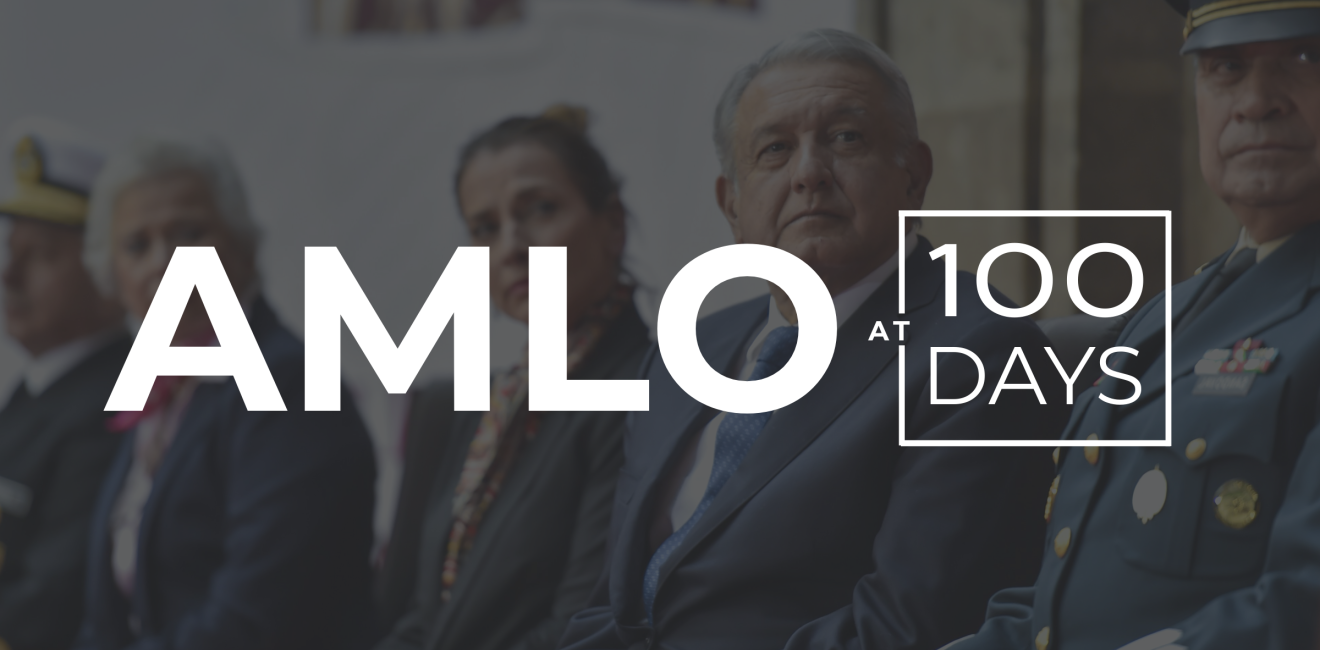Andrés Manuel López Obrador’s First 100 Days: Missteps and Hyperbole
A commentary on President Andrés Manuel López Obrador's first 100 days in office.
A commentary on President Andrés Manuel López Obrador's first 100 days in office.

The first 100 days of López Obrador’s presidency mark an unthinkable setback for Mexico. He has reduced the civil service to mediocrity, he has weakened democratic practices that took decades to put into place, and he has used the force of the State to attack both autonomous bodies that serve as important checks and balances, as well as Non-Governmental Organizations that have been a vital counter voice. He will test the will of those Mexicans who consider these setbacks unacceptable.
It is hard to imagine a more eventful start to a presidency. Defying logic, AMLO decided to halt the construction of Mexico City’s New International Airport (NAIM), the largest public works project ever undertaken in Mexico, and the largest building site in Latin America. Despite his resounding electoral mandate, he sought to justify his decision by holding a blatantly illegal and biased referendum.
López Obrador revoked the National Education Reform, which returned control of the teachers’ massive payroll to the Mexican state. He decided to stop granting exploration and production projects, via public contracts, retreating from landmark legislation that opened the energy sector to foreign oil companies. The constitution of Tabasco, his home state, was amended in order to award the contract to build the Dos Bocas refinery without a competitive tender. In a similar fashion, the new administration has also begun awarding contracts tied to the construction of the Tren Maya, sidestepping the bidding process.
AMLO shockingly reversed a landmark governmental policy, which has historically differentiated Mexico from the rest of Latin America, where the military exerts considerable political influence. President López Obrador introduced a proposal to create a new National Guard under military command, as well as proposing to expand the Santa Lucia Air Force Base – replacing the NAIM project – which would be entirely built by the armed forces, while giving them all of the revenue generated from the airport. Additionally, he decided to give to the military the transportation of gasoline using tanker trucks to the military, an activity that has historically been riddled with corruption. Lastly, the military will develop a luxury real estate project in Santa Fe, a residential and commercial area on the outskirts of Mexico City.
Following a strategy that served him well while mayor of Mexico City, AMLO conducts a daily morning monologue disguised as a “press conference” in order to set the media agenda. During these early morning sessions, he eagerly “corrects” official government data and is not hesitant to use the bully pulpit to lash out at those who question him. Unabashedly, he decided to use the Financial Investigation Unit of the Ministry of Finance to investigate Guillermo García Alcocer, head of the Energy Regulatory Commission (CRE), because he dared to question the qualifications of AMLO’s nominees to fill vacancies on the regulator’s board. Without offering proof, he accused García Alcocer of conflicts of interest and insinuated that his family was involved in money laundering due to their frequent trips to Central America.
During AMLO’s first 100 days, we have seen the Mexican civil service go from being one of the most competent and highly educated on the planet, to one filled by mediocre bureaucrats whose only distinction is their unwavering loyalty to the president. This carelessness has begun to cause problems. During the height of the December holidays, an unfortunate gasoline shortage was created as a result of the new government officials at the Ministry of Energy’s decision to reduce imports of U.S. light crude as well as the additives needed to operate Mexican refineries. In the face of the crisis, the administration created a smoke screen saying that the scarcity was caused by a government crackdown on fuel theft, which forced them to close pipelines. We now face a fuel shortage, as they have failed to restock inventory, showing their poor understanding of procurement and distribution channels.
Due to their incompetence, the government will have a difficult time spending federal budget already earmarked, given that they have created a massive bottleneck by centralizing all public procurement processes in the Administrative Office of the Ministry of Finance. This will have a negative impact on much needed growth, since private investment (domestic and foreign) is currently paralyzed.
The beginning of the López Obrador presidency presents an enormous challenge to the many Mexicans who share his assessment and concerns regarding the myriad of problems facing the country: exclusion, endemic corruption, crony capitalism, inequality, and stagnant economic growth, and yet do not share his proposed solutions; for those who see in him the threat of a politician well-versed in the old-school ways of a totalitarian and clientelist PRI; someone who is merely concerned with replacing a technocratic elite with one that is more loyal, doctrinaire, and submissive. The future of Mexico will be defined by the desire of the Mexican people to rise to the challenge.

The Mexico Institute seeks to improve understanding, communication, and cooperation between Mexico and the United States by promoting original research, encouraging public discussion, and proposing policy options for enhancing the bilateral relationship. A binational Advisory Board, chaired by Luis Téllez and Earl Anthony Wayne, oversees the work of the Mexico Institute. Read more


